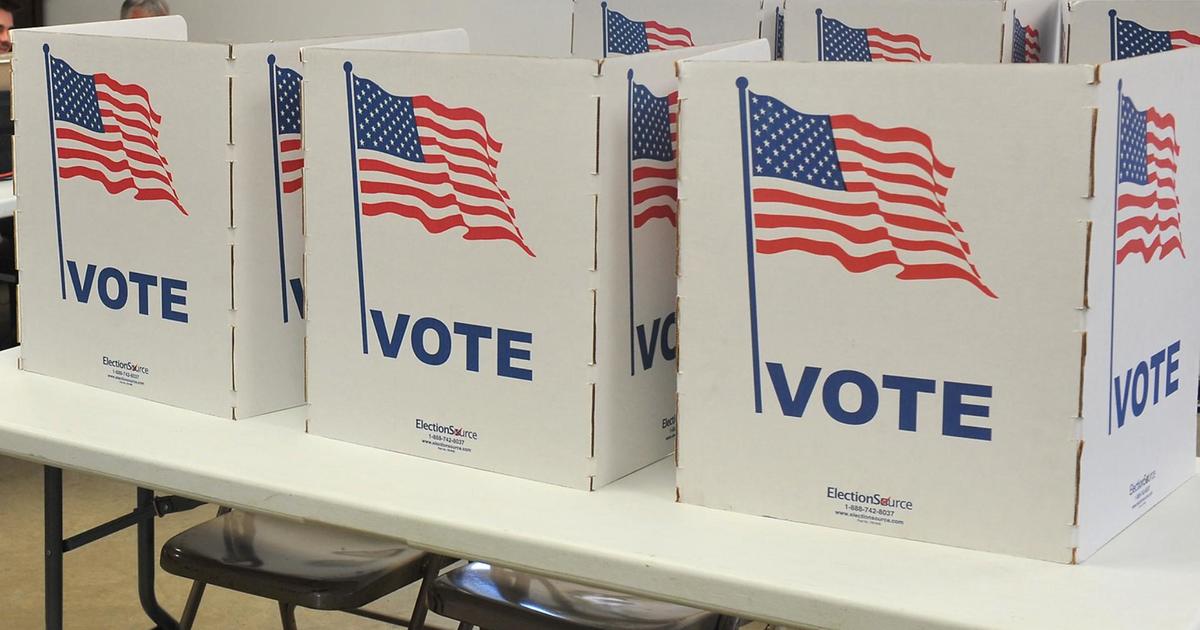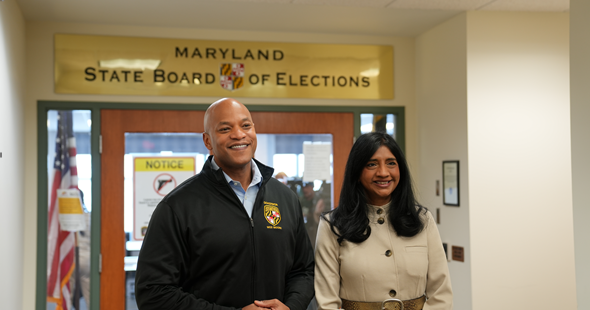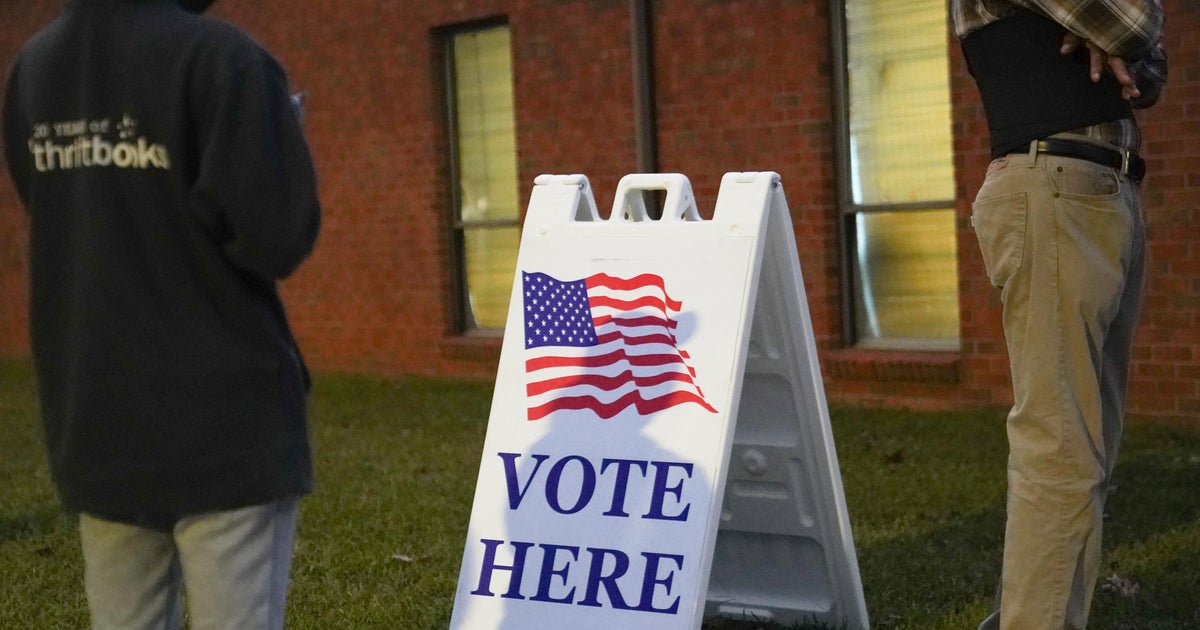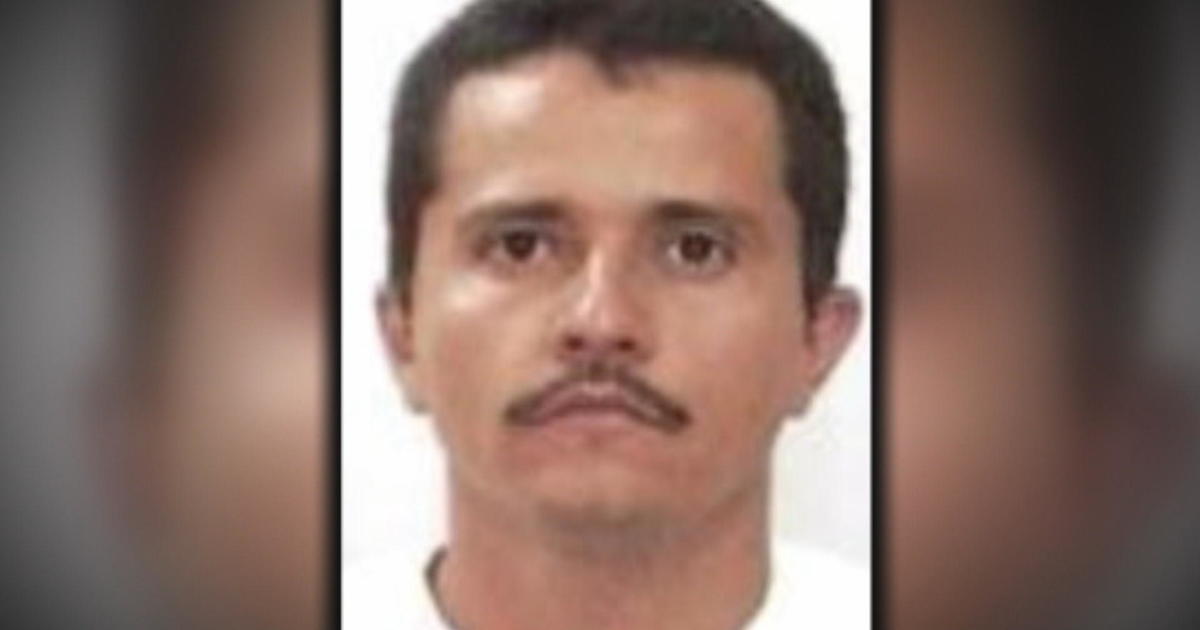WJZ's voter guide to the 2022 general election
BALTIMORE -- Maryland's General Election is coming up fast.
Fulfilling our civic responsibilities is important, but there's a lot to keep track of. Here are the important dates to know and information on registering to vote and finding your polling or early voting place, as well as noteworthy races and ballot questions.
Are you registered?
The first thing to do is make sure you are registered to vote. Marylanders can find out if they are registered simply by looking themselves up in the Board of Election's voter lookup page.
The voter lookup also tells users more important information such as your voter district, local board of elections, and polling places near you.
To register to vote, you need to be a U.S. citizen, a Maryland resident and at least 16 years old. (You cannot cast a ballot unless you are at least 18 years old at the time of the next general election.)
Those who have been convicted of buying or selling votes, have been found by a court to be unable to communicate a desire to vote, or are serving a sentence of imprisonment for a felony conviction are unable to register.
You can register to vote by using the state's online voter registration. Registering in person is also available at local boards of election offices, any MVA location, your local Department of Health office, and several other locations like public universities.
Residents can also register by mail by printing a voter registration form and mailing it to their local election office.
The deadline to register is Tuesday, Oct. 18. You can always register to vote at a polling place, but it's recommended to register beforehand.
Key dates
Oct. 18: Deadline for voter registration, updating registration or changing your party affiliation
Nov. 1: Requests for mail-in ballots close
Oct. 27-Nov. 3: Early voting for the 2022 election
Nov. 8: Election Day
How to vote
There are three ways to vote: by mail-in ballot (formerly absentee ballots), during early voting, or on election day. This year, election day is Tuesday, Nov. 8, 2022.
Any registered voter can vote by mail. You can request a mail-in ballot online if you have a state-issued ID, fill out the form at your local board of elections, or sign up for the permanent mail-in ballot list to get a mail-in ballot every election.
Early voting is open from Thursday, Oct. 27 to Thursday, Nov. 3., and residents can now register to vote at early voting locations. Find your early voting center and don't forget to bring a document that proves where you live (it can be a state ID). Early voting locations are open between 7 a.m. and 8 p.m.
To vote on Election Day, go to your assigned polling place, which will be open between 7 a.m. and 8 p.m. All voters are encouraged to familiarize themselves with the ballot by reviewing the sample ballot sent in the mail.
Disabled voters are urged to review the accessibility features of the state's voting system.
Key races to watch
- Governor: Although Maryland is considered a heavily Democratic state, Republicans have held Government House for the last eight years, and 12 of the last 20. Wes Moore, an author and former nonprofit CEO, looks to win the governor's race for the Democrats after coming out on top in a crowded primary. Donald Trump-backed Del. Dan Cox beat Hogan's hand-picked successor, former Commerce Secretary Kelly Schulz. Moore has run a campaign on creating more economic opportunity for Marylanders, while Cox has said he would reduce taxes, remove critical race theory from schools and increase school choice.
- Comptroller: After making a bid for governor, Peter Franchot is leaving the comptroller's office after 16 years. Baltimore Democrat Del. Brooke Lierman and Republican Harford County Executive Barry Glassman are running to replace him. Glassman is touting his record as an executive who didn't raise taxes, while Lierman says she will modernize the office and prioritize transportation and green energy as one of three voting members of the Board of Public Works.
- Attorney General: Brian Frosh is leaving after two terms as the state's top law enforcement official. Rep. Anthony Brown, a former lieutenant governor and gubernatorial candidate, beat his former boss' wife, Katie Curran O'Malley, in the primary. On the Republican side, Michael Anthony Peroutka, a former Anne Arundel County Council member with reported ties to the League of the South, which is classified as a hate group by the Southern Poverty Law Center, is the nominee. Brown says he will protect voting and reproductive rights. Peroutka recently pledged to bypass state laws on abortion and same-sex marriage.
- 1st Congressional District: The Democrat-controlled Maryland General Assembly approved a new congressional map trying to make this area more competitive for the party's nominee. But a judge ruled it was unconstitutional. Even so, incumbent Rep. Andy Harris, Maryland's lone Republican in the U.S. House of Representatives, faces a formidable challenge from Heather Mizeur, a former member of the House of Delegates and candidate for governor. Harris has staked a position as the only Maryland Congressman to vote against President Biden's policies, while touting his own record on cutting taxes and combatting the opioid epidemic. Mizeur has labeled Harris as an extremist and said she will boost the economy in the district and take action on climate change in a way that helps Eastern Shore farmers.
- Anne Arundel County Executive: Republican Councilwoman Jessica Haire is challenging incumbent Democrat Steuart Pittman. She has criticized Pittman's record on taxes and spending, saying she'll lower taxes for residents. Pittman has said his administration has created better schools, enhanced public safety and enacted tougher environmental regulations. He said his budget improves the county's financial standing.
- Baltimore County Executive: Democrat incumbent Johnny Olszewski Jr. is facing off against Republican Pat McDonough, a former state delegate. McDonough has previously run for Congress and county executive. Olszewski has touted his accomplishments navigating the COVID-19 pandemic, providing record funding for education and investing in sustainability. Using the motto "Save Our County," McDonough has said he will impose a zero-tolerance policy for crimes, remove Superintendent Darryl Williams and encourage school choice.
- Howard County Executive: This 2018 rematch pits Democratic incumbent Calvin Ball against Republican Alan Kittleman. In 2018, Ball unseated Kittleman with a six-point win. In his bid to get the office back, Kittleman has said he would undo Ball's decision to remove school resource officers from middle schools, direct police to use community-based pratices and cut taxes. Ball touts his record on increasing education funding, handling of the COVID-19 pandemic and creating a more efficient government.
Noteworthy ballot questions
Statewide
Question 4 would make cannabis legal in the state for people age 21 and older. The measure would take effect July 1, 2023. According to the most recent Goucher Poll, 59% of residents are in favor of the ballot question.
Question 1 would rename Maryland's two appellate courts, the Maryland Court of Appeals and Maryland Court of Special Appeals, which can be confused with each other. If passed, the Court of Appeals, the state's highest court, would become the Supreme Court of Maryland, and the presiding judge will be known as the Chief Justice.
The Court of Special Appeals would be changed to the Appellate Court of Maryland.
Local
Baltimore City
Question E would prohibit the sale of the "underground conduit system for cables, wires and similar facilities." In 2018, voters approved a similar measure for the city's water and sewer system, effectively shutting down attempts to privatize the utilities.
Worded rather ambiguously, Question H would establish "a Baltimore City Police Department, the head of which is the Police Commissioner." Doesn't that already exist? Yes, but up until now, the Baltimore Police Department has been a state agency, an arrangement dating back to the outset of the Civil War, according to research from the Abell Foundation.
During the 2021 session, the Maryland General Assembly passed a bill that would return control of the department to the city. A representative from Mayor Brandon Scott's office confirmed this question would formalize that transfer.
Question I changes up the makeup of the Inspector General Advisory Board, making the members of the panel primarily citizens. The current board includes City Solicitor James Shea and council members Eric Costello and Sharon Green Middleton. Overall, two picks are appointed by the mayor, one pick is appointed by the comptroller, two picks are appointed by the city council president, and two are jointly appointed by mayor and council president.
Under this new format, 11 residents who are not elected officials, lobbyists or candidates for office would serve on the board. "Seven of the members will be chosen at random from those nominated by City Councilmembers from their districts. Two members will be the heads of the local law schools. One member will be from a group of certified public accountants and one member will be from a group of fraud examiners."
Question K imposes a two-term limit on the mayor, comptroller, city council president, members of the city council and other elected officials, starting with candidates elected in 2024.
A group chaired by former Republican council candidate Jovani Patterson, going by the People for Elected Accountability and Civic Engagement, is championing the ballot measure, according to campaign finance records.
David Smith, executive chairman of the Sinclair Broadcast Group, has provided $385,000 of the group's $387,465 budget, according to records.
Anne Arundel County
Question B would increase the number of consecutive four-year terms a council member can serve, from two to three. Only Councilman Andrew Pruski, vice chairman of the council, is currently serving a second term, set to end in December. The other six members are wrapping up their first term.
Question H changes language in the county charter to be gender-neutral.
Cecil County
Question D would create an Ethics Commission composed of three members appointed by the county executive and two members appointed by the county council.
Question E would require the county government to provide records on contracts and purchases of more than $100,000, including a description, price, vendor, source of funding and the number of bids. The information would be presented to the county council after a contract is awarded.
Harford County
Question B establishes a procedure for removing a member of the county council who has failed to perform their duties for "a continuous period of six months." The council is made up of seven members. Five votes are needed to remove a member after a hearing has been held.
If a member has been removed, they have 10 days to appeal the decision to the Circuit Court of Harford County, and appeals can be taken to the state's highest court.
Howard County
Question A would prohibit the county from using funds to enforce federal immigration laws, ask about a person's "citizenship, nationality, or immigration status," share their status, or discriminate against a person based on their status.
County police can still take part in task forces related to immigration enforcement so long as county funds are not used.
"The County must take specific steps to put the law into practice, including developing policies related to it, disciplining County employees who violate the law, and reviewing complaints of violations," the question states.
Talbot County
Question A increases the pay for county council members from $14,400 to $23,000. The president of the council would continue to receive an additional $1,000. If approved, the new salaries would take effect for the council taking office in December.
Question B would authorize the council to adopt resolutions setting compensation for its members. Four of the five members would have to approve such a measure, and it must be passed before the next general election. The raises would take effect after that election.
How to get involved
Those who want to do more than vote in the election can help the state by being challengers and watchers, election judges, or voter registration distributors.
Election judges are responsible for running a polling place, which includes supervising, verifying voters, and directing and instructing voters.
Challengers and watchers have access to voting centers to observe voting activities, including the work of the election judges.
Registration volunteers spread the word about registering to vote and offer residents the opportunity to register. The volunteers can assist people with completing applications and return them to their county election office.







